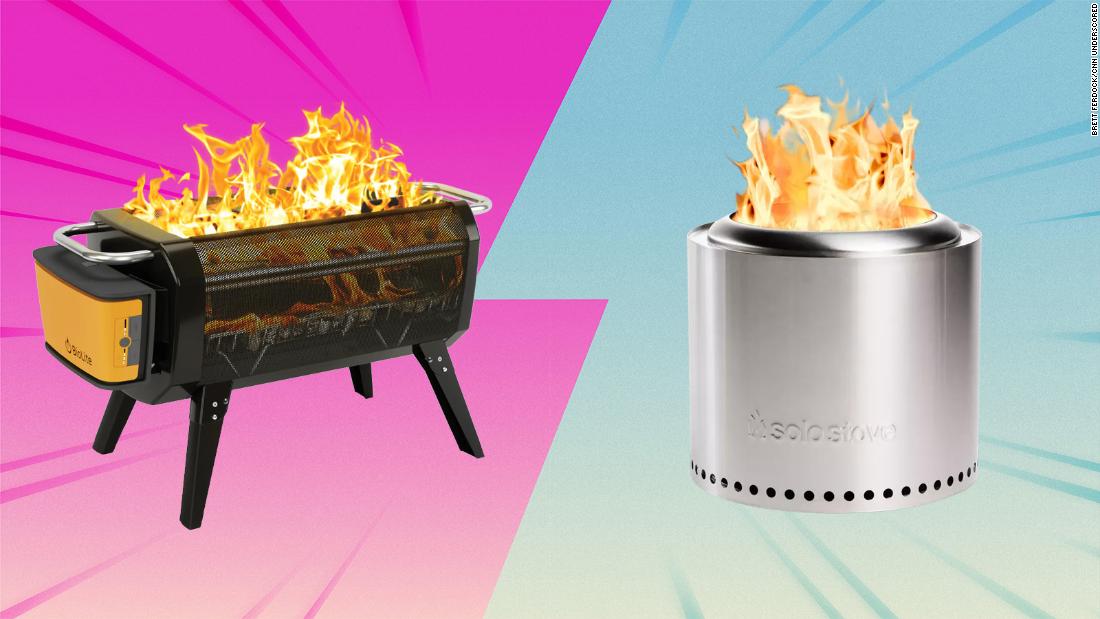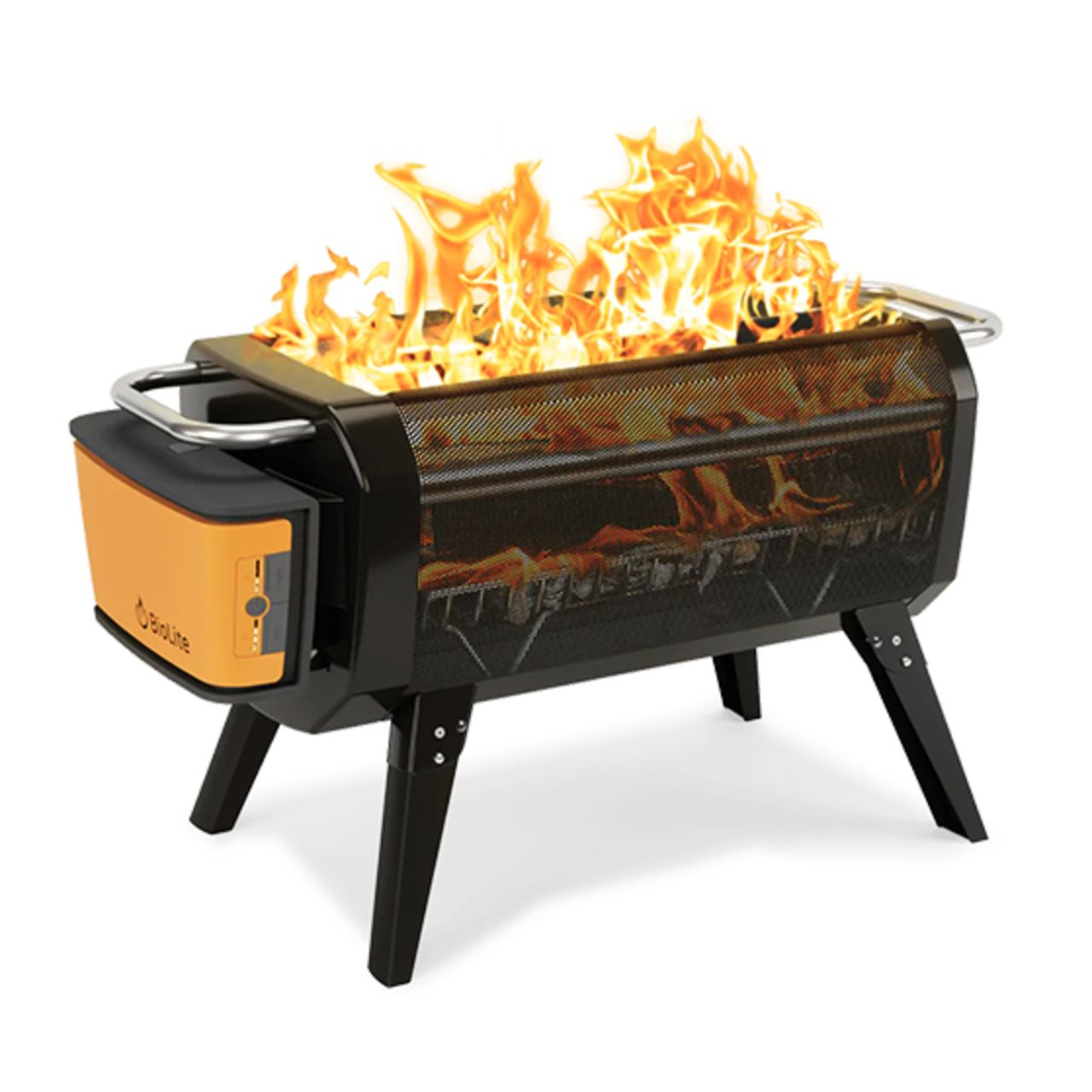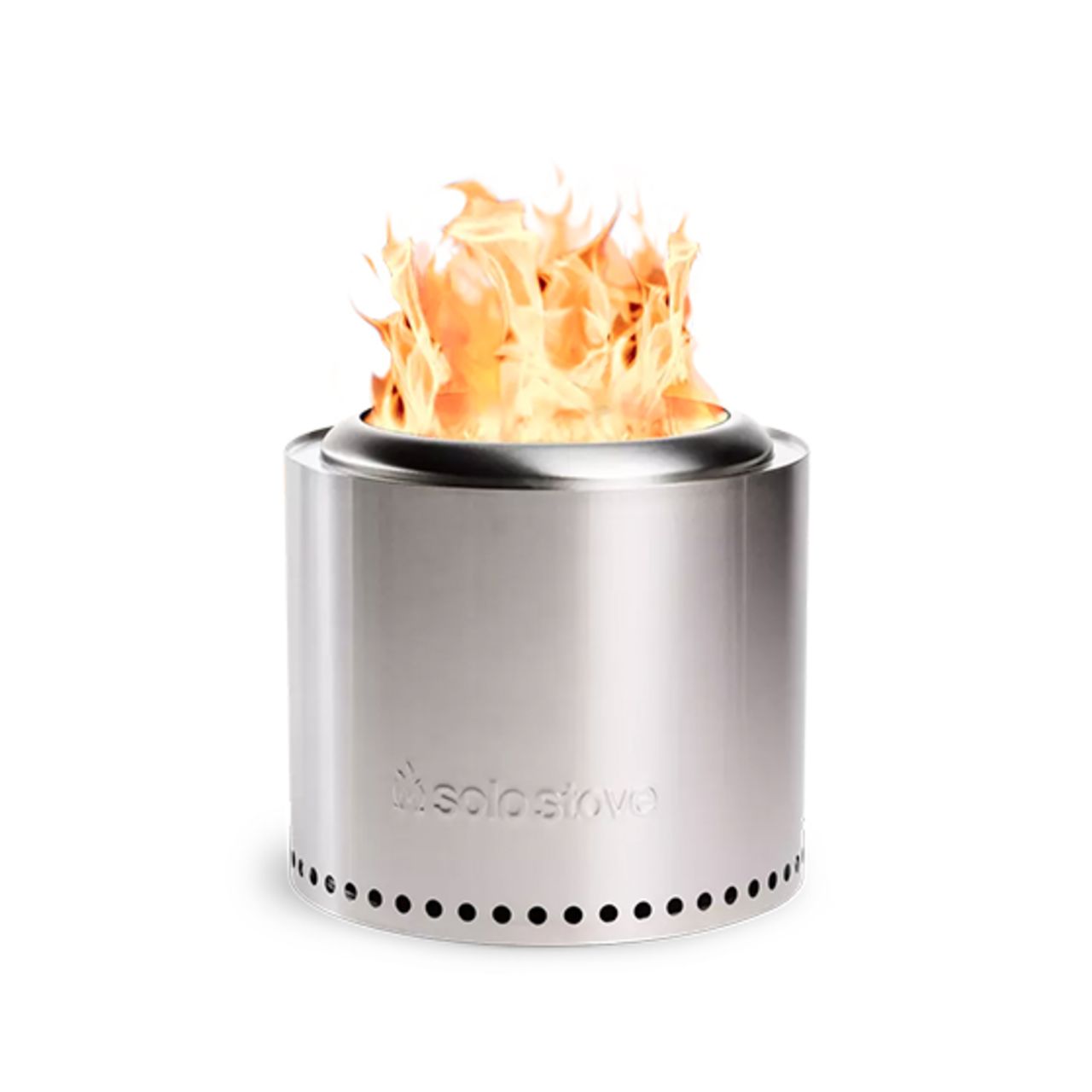This article is part of our series Battle of the Brands, in which we compare category-leading products to their counterparts to determine which are actually worth your money.
Enjoying the great outdoors is even better around the campfire. That’s because bonfires are a quintessential experience in nature, no matter whether you’re in your backyard or the middle of the wilderness.
The BioLite FirePit+ and Solo Stove Ranger 2.0 are some of the biggest names in portable, smoke-free fire pits (and two of our favorites too). These fire pits provide both the portability and convenience of having a campfire no matter where you go, whether it’s in the city, on the beach or in the backwoods, with a fraction of the smoke and frustration.
One burning question remains: Which fire pit is right for you?
| Weight |
19.8 pounds |
15 pounds |
|---|---|---|
| Dimensions |
27 x 13 x 15.8 in. |
15 x 12.5 in. |
| Materials |
Stainless steel with high-temp enamel coating |
Stainless steel |
| Fuel type |
Firewood or charcoal |
Firewood or wood pellets |
| Included accessories |
Grill grate, fuel rack and USB-A to Micro USB cord |
Carrying case, removable base plate and ash pan |
| Price |
$300 |
$200 |
Ignition, smoke and capacity
Both of these fire pits tout a fire-burning experience that’s superior to a traditional fire thanks to their designs. Each claims to help you start a fire faster and burn it with little to no smoke. To compare the fires in each pit, I used the same amount of materials to get the campfire started: a single piece of crumpled-up newspaper and a few pieces of kindling. With the FirePit+ fan (powered by a detachable and rechargeable 12,000mAh battery pack) set to speed three of four, I waited to see how long it would take both the FirePit+ and the Solo Stove to ignite the kindling.
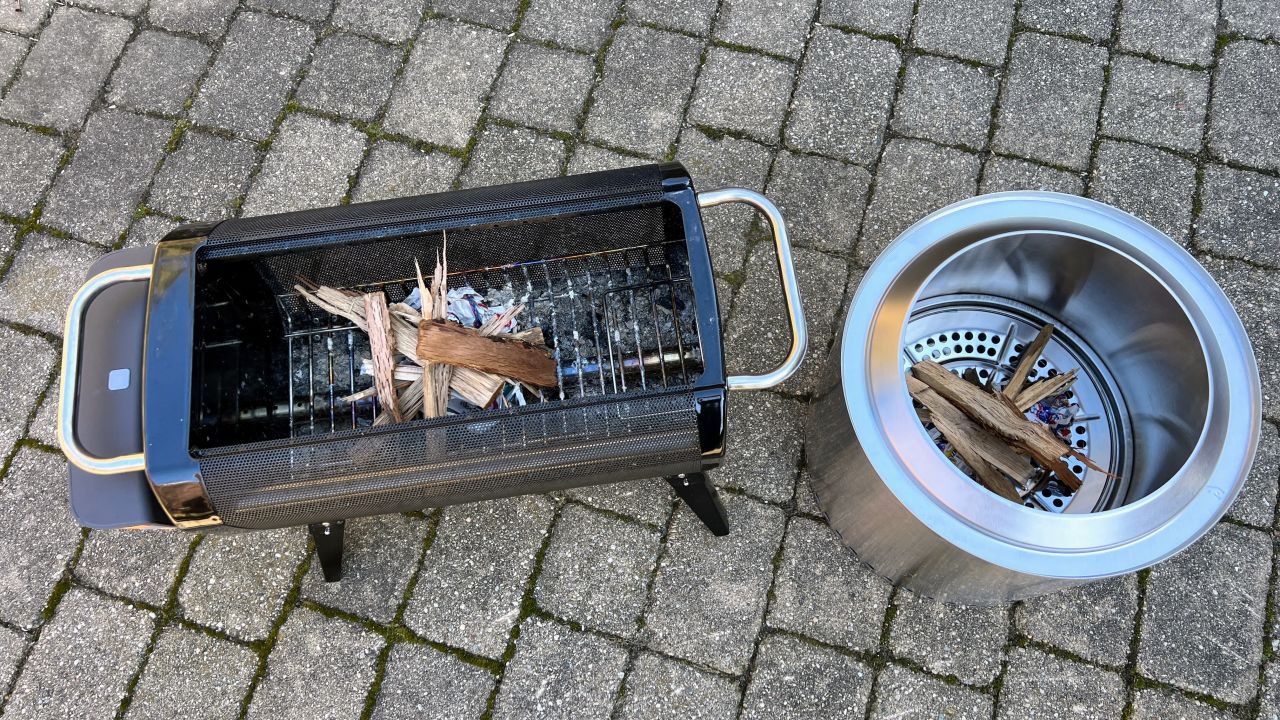
One minute and 30 seconds later, both fires were burning at nearly the same rate. I then added two slightly larger pieces of kindling onto the flames. Two minutes later, the Ranger’s flames were raging almost double the size of the FirePit+. Around the five-minute mark, I added one large piece of wood to both fire pits. Again, the Ranger burst into flames as the FirePit+ flames grew more gradually.
While the Ranger was able to grow its fire much faster than the FirePit+, its big downfall is its inability to fit standard-size logs. Regular pieces of wood, which you can buy at the grocery or hardware store, would not fit into the base of the Ranger fire pit. In order to fit it inside the Ranger’s base, you’d need to cut a regular piece of firewood in half, or else you’re stuck with a log (or logs) sticking out of the top of the pit, which felt hazardous. On the other hand, the FirePit+ can fit three regular size logs inside its base.
The Solo Stove Ranger fire pit had a significantly hotter and larger flame than the BioLite FirePit+ and required about half the amount of wood, as it burned much stronger and more efficiently. But at times, the flames rose over 1 foot high and it felt unsafe to burn more than two pieces of wood inside. This is great if you want a fire fast and you can pay close attention to how much wood you add, but we thought the flames of the BioLite FirePit+ were much more manageable. The flames stayed contained inside the base of the FirePit+ and I was able to fit two to three more logs in the BioLite than the Ranger. I also appreciated the built-in handles on the sides of the FirePit+, which allow you to quickly and easily move the fire pit around, even when the fire’s burning. Once you light the Solo Stove, you won’t be able to move it until it’s cooled down.
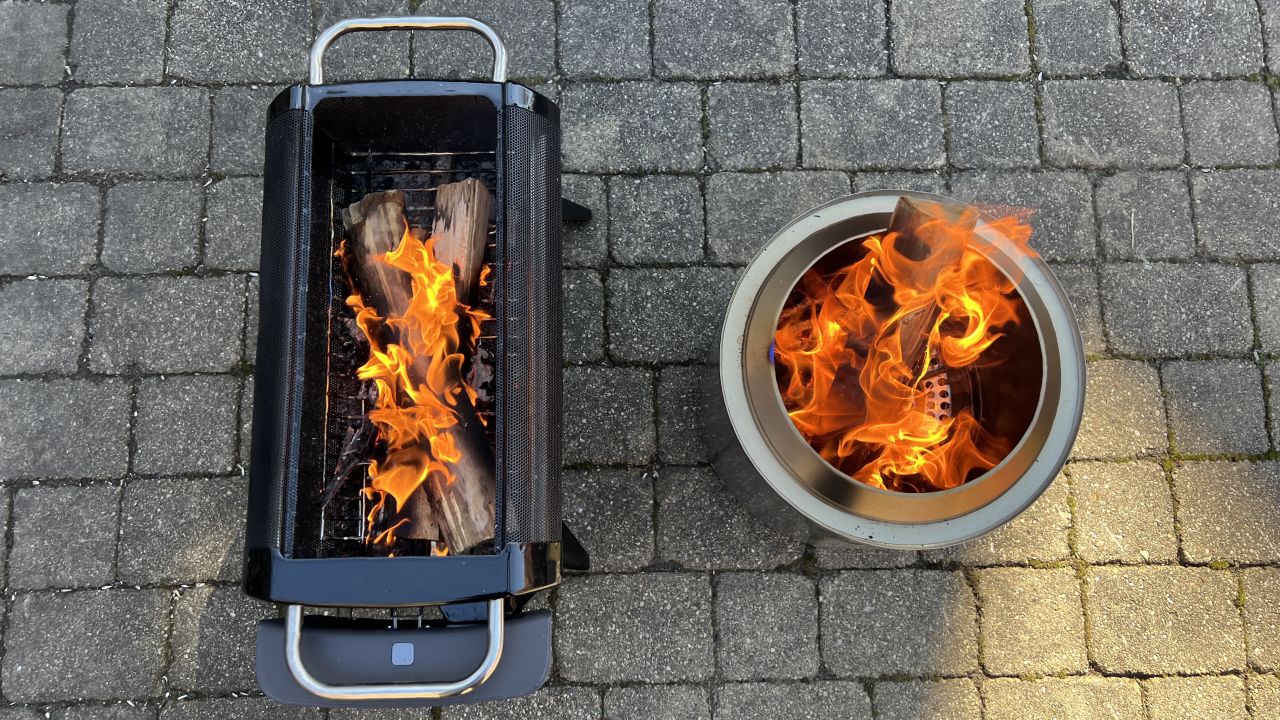
Both the BioLite FirePit+ and Solo Stove Ranger burn with a fraction of the smoke of a regular campfire, a huge selling point for each. The FirePit+ has a detachable and rechargeable battery pack that helps fan the flames so you don’t have to, creating a nearly smokeless experience with none of the hassle and stress of a regular campfire. The Ranger, on the other hand, doesn’t use fans but instead relies on its signature 360-degree Airflow design, which also results in dramatically less smoke than a normal bonfire.
The FirePit+’s built-in fan, along with a mesh exterior that adds extra airflow, did their job, enabling the FirePit+ to burn with very little to no smoke. I found the Solo Stove let off slightly more smoke than the BioLite FirePit+ because of its inability to fit normal-sized logs. Any logs sticking out of the top billowed with smoke, especially as the fire died down over time.
Weight and portability
Weighing 4.8 pounds less than the BioLite FirePit+ (19.8 pounds), the Solo Stove Ranger (15 pounds) is not only lighter, but also boasts a sleeker and simpler design. Its smooth base without legs makes the Ranger super easy to set up and pack away — no fussing with foldable legs and battery packs like the FirePit+. I also appreciate that the Solo Stove Ranger comes with a free durable and waterproof carry case, unlike the BioLite FirePit Carry Bag, which costs an extra $60.
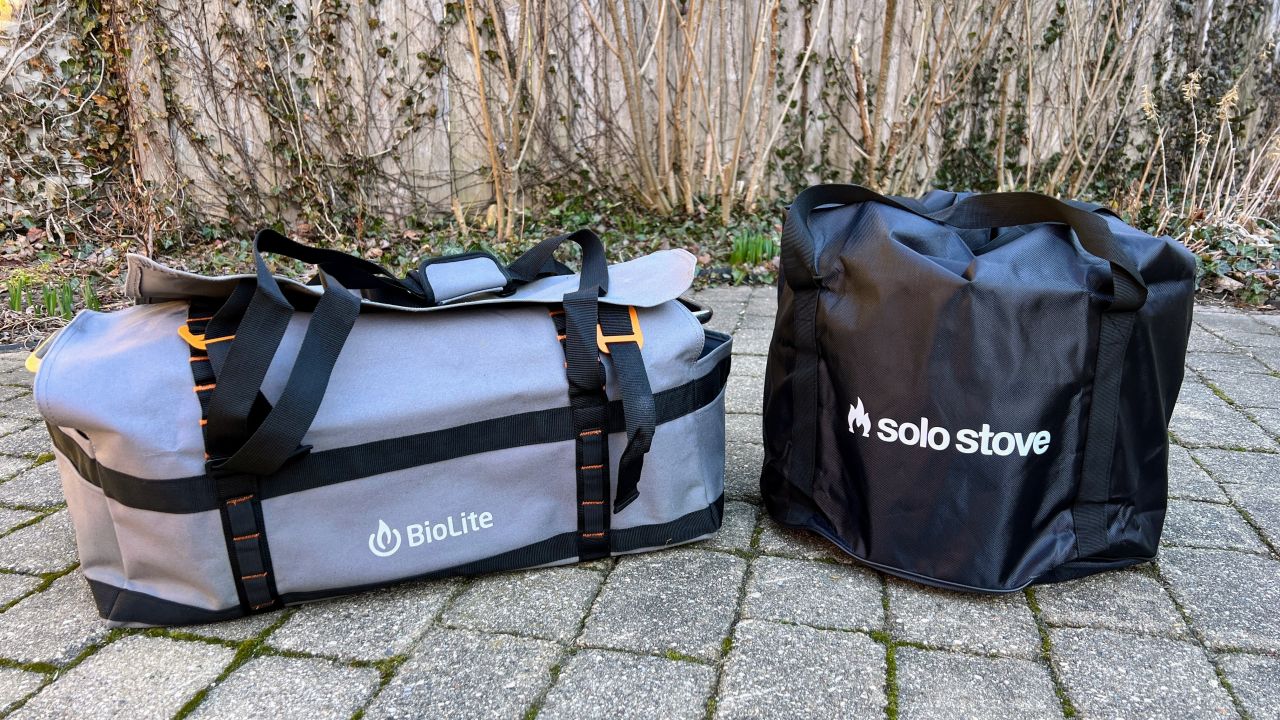
That said, even with the added weight, I found the FirePit+ easier to transport both inside and outside of the protective carry bag. When it’s inside the carry bag, you can easily hoist the FirePit+ over your shoulder like a bag of groceries and secure the rectangular fire pit against your side body. The Ranger’s cylindrical shape, on the other hand, makes it harder and more awkward to carry around.
Despite their differences in weight and shape, these are extremely portable fire pits. Both can fit into the trunk of your car or inside a storage unit or closet if you live in a city, with plenty of room to spare. The BioLite is slightly taller and wider than the Ranger; however, the rectangular shape of the FirePit+ may be more conducive to a Tetris-style packed car if you have a lot of camping gear to bring with you to the campground.
Related: Solo Stove’s new pint-sized Mesa fire pit is perfect for small spaces
Unlike the Ranger, the FirePit+ comes with a stainless steel grill grate that rests on top of the frame of the fire pit. Choose between filling the BioLite fire pit with charcoal or standard wood, both of which you can cook food on. BioLite sells a cooking accessories set ($194) to turn your fire pit into the ultimate outdoor grill master setup, including a durable pre-seasoned cast-iron griddle ($60), a grill lid for faster cook times ($80) and rust-resistant stainless prep and grill toolkit ($50). Be warned though: You may not want food grease and oil dripping into your high-tech fire pit. The Ranger also has additional cooking accessories, each sold separately, like the cast-iron grill top, cast-iron griddle top, cast-iron wok top (each $75) and the Ranger Pi Fire ($200) pizza oven.
Solo Stove has a wide variety of additional accessories to make your experience with the Ranger even better, including a stand, heat deflector, lid, handle, shield and more. The brand also recently launched its Fire Pit Pellet Adapter ($40) which allows you to burn wood pellets instead of logs, which claim to produce less smoke and ash while burning even more efficiently than regular wood.
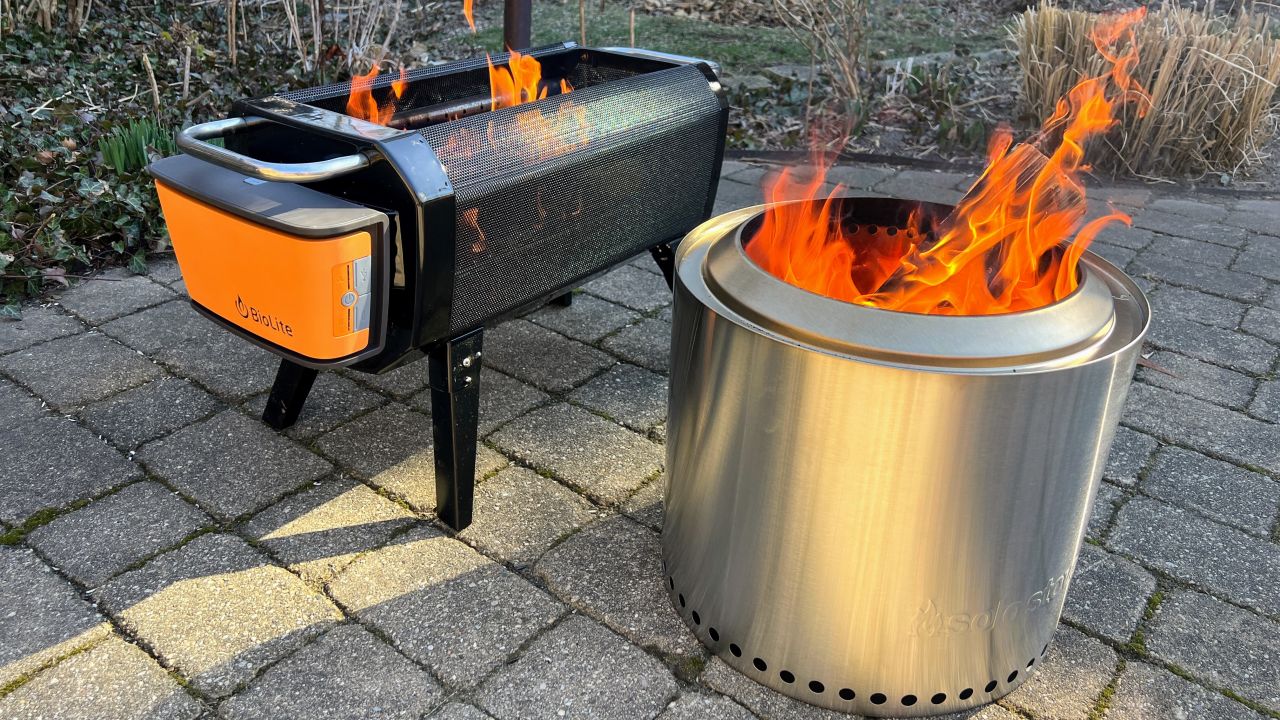
The Solo Stove Ranger 2.0 and BioLite FirePit+ are both great options if you’re looking for a portable, low-smoke fire pit. If you want a minimalist fire pit that’s a bit more lightweight and you care about fires that light fast and burn super efficiently — and look great too — the Solo Stove Ranger is the one for you.
For an extra $100, however, the BioLite FirePit+ gives you an abundance of added features you simply won’t find in the Ranger. It burns with less smoke and can actually fit multiple logs without any flaming bits sticking out. Plus, moving it around is easier, thanks to its integrated handles and rectangular design.
No matter which you pick, we promise you (and your campfire) will be stoked.

